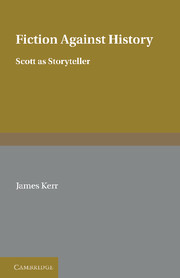Book contents
- Frontmatter
- Contents
- Acknowledgements
- A note on citations of the Waverley novels
- 1 The historical novel and the production of the past
- 2 The reemplotment of rebellion: Waverley and Old Mortality
- 3 Historical fable and political fantasy: The Heart of Midlothian and The Bride of Lammermoor
- 4 Redgauntlet: the historical romance as metafiction
- Notes
- Index
2 - The reemplotment of rebellion: Waverley and Old Mortality
Published online by Cambridge University Press: 28 January 2010
- Frontmatter
- Contents
- Acknowledgements
- A note on citations of the Waverley novels
- 1 The historical novel and the production of the past
- 2 The reemplotment of rebellion: Waverley and Old Mortality
- 3 Historical fable and political fantasy: The Heart of Midlothian and The Bride of Lammermoor
- 4 Redgauntlet: the historical romance as metafiction
- Notes
- Index
Summary
WAVERLEY: THE ROMANCE OF REAL HISTORY
Near the end of Waverley, Scott's hero feels himself “entitled to say firmly, though perhaps with a sigh, that the romance of his life was ended, and that its real history had now commenced” (ch.60; 281). But at this moment Scott's historical romance is far from over. The passage marks not the end of romance in the novel, but the end of Waverley's romantic phase. Romance is apparently reduced here to the status of mere fictional mode, to an artificial and therefore false way of perceiving things. “Real history” will be what Waverley experiences henceforth. If we read the novel as the story of the hero's education, as an account of his growth from ignorance to wisdom, we might regard the passage as meaning that Waverley has finally shed his romantic delusions and arrived at a true perception of reality, and as implying that Scott himself is on the side of “real history” and against “romance.” But we cannot simply identify Scott's perspective with that of his character. To regard the anti-romantic temper of Waverley's perceptions here as an expression of the author's position is to neglect the context for the passage which Scott provides in his reflections on the power of art. The “real history” of Waverley's life has for Scott the same fictive status as its “romance.”
- Type
- Chapter
- Information
- Fiction against HistoryScott as Storyteller, pp. 18 - 61Publisher: Cambridge University PressPrint publication year: 1989

